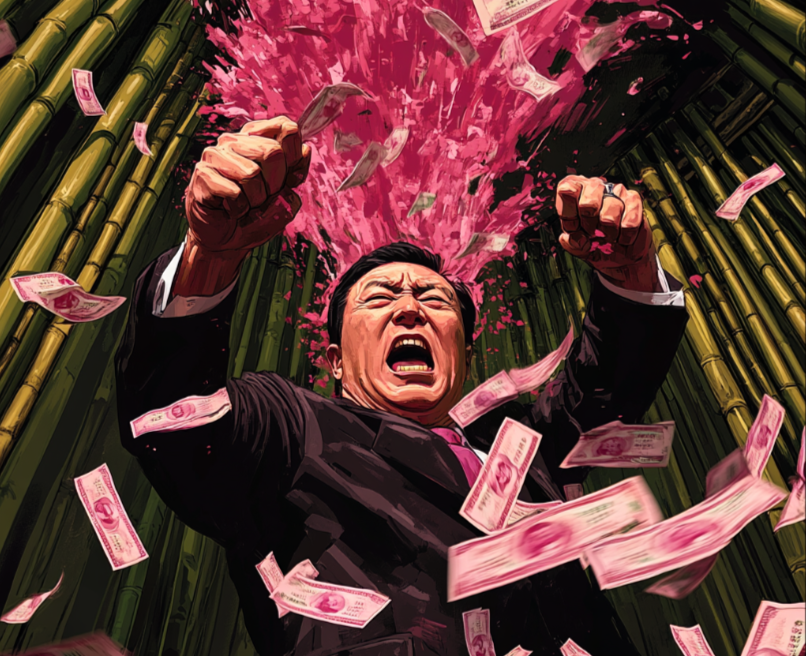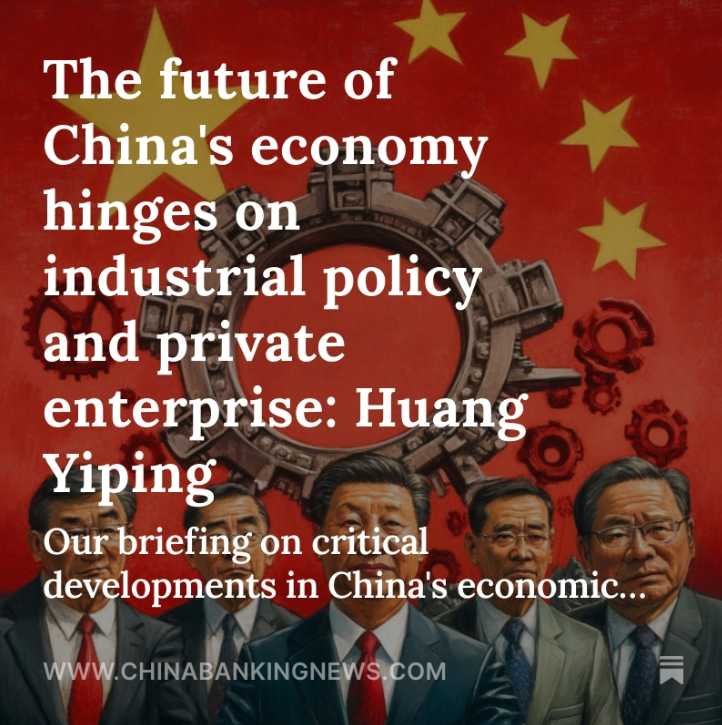1/15
The chief of research at China's central bank just unveiled its blueprint for financial transformation.
Beijing wants China to become a "great financial power" globally.
It also wants stock and bond markets to play a central role in China's technological rise (🧵):
The chief of research at China's central bank just unveiled its blueprint for financial transformation.
Beijing wants China to become a "great financial power" globally.
It also wants stock and bond markets to play a central role in China's technological rise (🧵):

2/15
On 18 May, Ding Zhijie (丁志杰) ,the head of the Chinese central bank's research department, presided over the release of the "China Financial Policy 2025 Report" (中国金融政策报告2025) at the Tsinghua PBCSF Global Finance Forum.
On 18 May, Ding Zhijie (丁志杰) ,the head of the Chinese central bank's research department, presided over the release of the "China Financial Policy 2025 Report" (中国金融政策报告2025) at the Tsinghua PBCSF Global Finance Forum.
3/15
The theme of this year's report is "Continued Deepening of Financial System Reforms - Accelerating the Development of a Modern Financial System with Chinese Characteristics" (持续深化金融体制改革 加快建设中国特色现代金融体系)
(Thanks for reading!
Get smarter about China's economy - sign up for free or premium updates read by the world's top hedge fund manager and global macro investors: chinabankingnews.com )
The theme of this year's report is "Continued Deepening of Financial System Reforms - Accelerating the Development of a Modern Financial System with Chinese Characteristics" (持续深化金融体制改革 加快建设中国特色现代金融体系)
(Thanks for reading!
Get smarter about China's economy - sign up for free or premium updates read by the world's top hedge fund manager and global macro investors: chinabankingnews.com )
4/15
Ding highlighted five recommendations from the report for advancing the ongoing reform of the Chinese financial system.
Ding highlighted five recommendations from the report for advancing the ongoing reform of the Chinese financial system.
5/15
One - Optimising the allocation of financial resources.
This will involve elevating the role of capital markets in a financial system long dominated by the state-owned banks.
One - Optimising the allocation of financial resources.
This will involve elevating the role of capital markets in a financial system long dominated by the state-owned banks.
6/15
Ding said China should "establish a resource allocation system with capital markets at their core, employing the core role of capital markets in resource allocation, and strengthening the ability of finance to support economic transition."
(Thanks for reading!
Get smarter about China's economy - sign up for free or premium updates read by the world's top hedge fund manager and global macro investors: chinabankingnews.com )
Ding said China should "establish a resource allocation system with capital markets at their core, employing the core role of capital markets in resource allocation, and strengthening the ability of finance to support economic transition."
(Thanks for reading!
Get smarter about China's economy - sign up for free or premium updates read by the world's top hedge fund manager and global macro investors: chinabankingnews.com )
7/15
China will continue to refine its "multi-tier capital system," driving the coordinated development of equity and bond financing, as well as supporting and entry of medium-and-long-term capital into the market.
A key focus for Beijing will be strengthening the supply of financial resources for strategic emerging industries and scientific and technological innovation.
China will continue to refine its "multi-tier capital system," driving the coordinated development of equity and bond financing, as well as supporting and entry of medium-and-long-term capital into the market.
A key focus for Beijing will be strengthening the supply of financial resources for strategic emerging industries and scientific and technological innovation.
8/15
Second is improving China's central banking system.
This will involve
- Smoothing out monetary policy transmission mechanisms.
- Deepening interest rate marketisation reforms.
- Improving the benchmark interest rate formation system.
- Raising the guidance role of policy rates.
- Raising the responsiveness of financial institutions.
- Optimising the design and incentive mechanisms for structured monetary policy tools.
- Driving the "precision irrigation" of key areas of the economy using financial resources.
Second is improving China's central banking system.
This will involve
- Smoothing out monetary policy transmission mechanisms.
- Deepening interest rate marketisation reforms.
- Improving the benchmark interest rate formation system.
- Raising the guidance role of policy rates.
- Raising the responsiveness of financial institutions.
- Optimising the design and incentive mechanisms for structured monetary policy tools.
- Driving the "precision irrigation" of key areas of the economy using financial resources.
9/15
Third is "consolidation of stable financial protections and strengthening regulation."
Beijing will "strengthen the coordination of macro and micro-prudential regulation, lawfully include all financial activity under supervision and regulation, and clarify the division between central and local regulatory responsibilities."
Third is "consolidation of stable financial protections and strengthening regulation."
Beijing will "strengthen the coordination of macro and micro-prudential regulation, lawfully include all financial activity under supervision and regulation, and clarify the division between central and local regulatory responsibilities."
10/15
A key focus will be reform and disposal of risk in relation to small and medium-sized banks, as well as raising their corporate governance capabilities and capital supplementation mechanisms.
(Thanks for reading!
Get smarter about China's economy - sign up for free or premium updates read by the world's top hedge fund manager and global macro investors: chinabankingnews.com )
A key focus will be reform and disposal of risk in relation to small and medium-sized banks, as well as raising their corporate governance capabilities and capital supplementation mechanisms.
(Thanks for reading!
Get smarter about China's economy - sign up for free or premium updates read by the world's top hedge fund manager and global macro investors: chinabankingnews.com )
11/15
Fourth is "firmly abiding by the essential role of finance," as well as raising the "quality and effectiveness of financial services."
Ding said that Chinese financial institutions need to focus on their "chief responsibility and business" of servicing the real economy.
Fourth is "firmly abiding by the essential role of finance," as well as raising the "quality and effectiveness of financial services."
Ding said that Chinese financial institutions need to focus on their "chief responsibility and business" of servicing the real economy.
12/15
He wants the Chinese financial system to "raise its efficiency and professional ability to allocate resources, as well as strengthen internal corporate management, risk controls and auditing.
He wants the Chinese financial system to "raise its efficiency and professional ability to allocate resources, as well as strengthen internal corporate management, risk controls and auditing.
13/15
Beijing will endeavour to prevent finance from "moving away from the real towards the empty," while also guiding the standardised implementation of fintech innovations and accelerating digital transformation.
Beijing will endeavour to prevent finance from "moving away from the real towards the empty," while also guiding the standardised implementation of fintech innovations and accelerating digital transformation.
14/15
Fifth is "vigorously driving the high-level opening of the Chinese financial sector, and accelerating the development of a great financial power."
This will entail "firmly driving renminbi internationalisation, and raising its cross-border payments, financing, investment and store of value functionality."
Fifth is "vigorously driving the high-level opening of the Chinese financial sector, and accelerating the development of a great financial power."
This will entail "firmly driving renminbi internationalisation, and raising its cross-border payments, financing, investment and store of value functionality."
15/15
To this end, China will:
- Strengthen connections and ties with offshore markets.
-Develop offshore renminbi products.
- Accelerate the development of international financial centres within China.
- Expand the openness and depth of its financial markets.
- Increase the influence of China's voice in matters of finance.
(Thanks for reading!
Get smarter about China's economy - sign up for free or premium updates read by the world's top hedge fund manager and global macro investors: chinabankingnews.com )
To this end, China will:
- Strengthen connections and ties with offshore markets.
-Develop offshore renminbi products.
- Accelerate the development of international financial centres within China.
- Expand the openness and depth of its financial markets.
- Increase the influence of China's voice in matters of finance.
(Thanks for reading!
Get smarter about China's economy - sign up for free or premium updates read by the world's top hedge fund manager and global macro investors: chinabankingnews.com )
• • •
Missing some Tweet in this thread? You can try to
force a refresh









